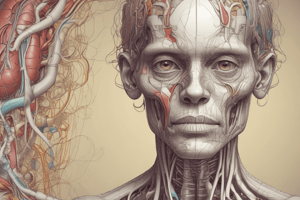Podcast
Questions and Answers
What is the main function of the excretory system in humans?
What is the main function of the excretory system in humans?
- To regulate body temperature
- To remove waste products (correct)
- To produce hormones
- To digest food
What is the term for the unique characteristics that emerge at each level of biological organization?
What is the term for the unique characteristics that emerge at each level of biological organization?
- Emergent properties (correct)
- Organismal traits
- Systemic characteristics
- Biomolecular features
Which organ system is responsible for protecting the body from external damage?
Which organ system is responsible for protecting the body from external damage?
- Integumentary system (correct)
- Muscular system
- Circulatory system
- Nervous system
What is the lowest level of organization in which emergent properties can be observed?
What is the lowest level of organization in which emergent properties can be observed?
What is the main function of the nervous system in humans?
What is the main function of the nervous system in humans?
Which of the following is an example of an organ?
Which of the following is an example of an organ?
What is the main characteristic of biological organization?
What is the main characteristic of biological organization?
What is the highest level of biological organization?
What is the highest level of biological organization?
What is the smallest structural unit capable of using energy to sustain itself in a highly ordered state?
What is the smallest structural unit capable of using energy to sustain itself in a highly ordered state?
What is the level of organization where groups of cells work together to perform a specific function?
What is the level of organization where groups of cells work together to perform a specific function?
What is the function of connective tissue?
What is the function of connective tissue?
What is the level of organization where groups of organs work together to perform a specific function?
What is the level of organization where groups of organs work together to perform a specific function?
What is the level of organization where all organ systems work together to form a unified whole?
What is the level of organization where all organ systems work together to form a unified whole?
What is an example of a tissue where more than one type of cell is present?
What is an example of a tissue where more than one type of cell is present?
What is the function of nerve tissue?
What is the function of nerve tissue?
What is the hierarchy of organization in multicellular organisms?
What is the hierarchy of organization in multicellular organisms?
What is a characteristic that emerges at the cellular level of biological organization?
What is a characteristic that emerges at the cellular level of biological organization?
What is the function of the organs in an animal body?
What is the function of the organs in an animal body?
What is a characteristic of tissues at the organ level?
What is a characteristic of tissues at the organ level?
What is the role of the endocrine and nervous systems in the body?
What is the role of the endocrine and nervous systems in the body?
What is a characteristic of the organism level of biological organization?
What is a characteristic of the organism level of biological organization?
What is the level of organization where the characteristics of 'life' emerge?
What is the level of organization where the characteristics of 'life' emerge?
What is unique about the properties of a water molecule compared to its constituent atoms?
What is unique about the properties of a water molecule compared to its constituent atoms?
What is a function of the cardiovascular system at the organ system level?
What is a function of the cardiovascular system at the organ system level?
Flashcards are hidden until you start studying
Study Notes
Biological Organization
- An organism is a living individual made up of interconnected parts that interact to perform functions necessary to sustain life.
Emergent Properties
- A property that emerges at each level of biological organization only when the parts interact in a wider whole.
- The whole is greater than the sum of its parts.
- New attributes or characteristics emerge at each level of organization that are not present in the lower levels.
Hierarchy of Biological Organization
- Cells are the basic unit of life, and are capable of using energy to sustain themselves.
- Tissues are groups of cells that work together to perform a function.
- Organs are groups of tissues that work together to perform a function.
- Organ systems are groups of organs that interact to perform a function.
- Organisms are made up of organ systems.
Cells
- Cells in multicellular organisms differentiate to take specific shapes and perform specific functions.
Tissues
- There are four basic types of tissue in humans: connective, epithelial, muscle, and nerve tissue.
- Tissues contain more than one type of cell that work together to perform a function.
Organs
- Organs contain more than one type of tissue and work together to perform a function.
Organ Systems
- Examples of organ systems include the nervous system, skeletal system, respiratory system, and circulatory system.
Integrations of Body Systems
- The organs of animal bodies are integrated to form a functioning whole.
- Integration involves effective communication and the transport of materials and energy.
- The endocrine system and nervous system work together to maintain body processes.
Studying That Suits You
Use AI to generate personalized quizzes and flashcards to suit your learning preferences.




